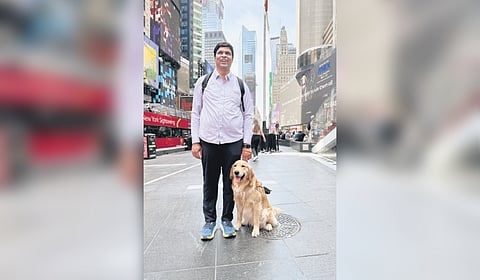

HYDERABAD : All his life, Kiran Kaja has worked to advocate for accessible technology for blind users, as technology has profoundly impacted his own life by helping him become independent and successful. Based in Hyderabad and now a Principal Product Manager on the Worldwide Stores accessibility team at Amazon in the US, Kiran has travelled to 52 countries with his three-year-old guide dog, striving for accessibility worldwide. As we celebrate Helen Keller Day on June 27, Kiran shares his journey with CE.
Born with a congenital eye condition known as retinitis pigmentosa, which left him with no functional vision beyond perceiving light, Kiran attended an integrated education system school in Hyderabad, where blind students took classes alongside sighted students. He received additional support through a resource teacher proficient in braille. “Despite Hyderabad’s status as one of the country’s largest cities, it lacked infrastructure or services to support blind children. Consequently, I didn’t start school until I was seven years old because my parents struggled to find an appropriate institution that would admit blind students. My mother decided to take matters into her own hands and learned Braille, teaching me how to read and write. Eventually, a group of 15 parents of blind children collaborated and founded a nonprofit organisation that convinced a private school to enroll their children. One parent even volunteered to be a resource teacher to assist the blind students. However, we faced numerous challenges; we only had one Perkins-style brailler for all 15 students, and no textbooks were available in Braille or other accessible formats. Instead, we had to use a Braille slate and stylus to take notes in class, with the resource teacher brailing a single copy of important sections from textbooks that 2-3 blind children had to share. My father also recorded some textbooks onto cassette tapes for me to listen to.”
He said the biggest barrier for him was the uncertainty around getting a scribe for board exams. “You never know who you will get to scribe for you and what they were writing. It was extremely demotivating to study hard for exams only to be faced with a scribe who can’t spell even basic words like ‘there’.”
During the summer holidays after high school, he discovered that computers could talk to him, which changed his world and helped him pursue higher studies, eventually leading to a job in accessibility. Talking about the accessibility programme, he explained, “I studied business administration in my undergrad and learned programming skills on the side by myself. I contributed to open-source projects to help build software for blind users. I also started an email group for blind computer users in India called AccessIndia, which is still going strong after 20 years. Following university, I worked for a Spanish company building screen reading software to make pocket PC devices accessible to blind people. Then I spent three years with SAP Labs in Bengaluru working in their Accessibility Test Lab. I relocated to the UK to work for the Royal National Institute of Blind People (RNIB) to help advocate for accessible technology. Ultimately, I moved to California, where I live today, and took a job at Google. In that role, I helped to establish and expand the accessibility programme for Google Search and Assistant, as well as lead the accessibility programme for Instagram. Today, I am employed at Amazon as a Principal Product Manager on the Worldwide Stores accessibility team. When I was at Google, I also worked on making the Waymo self-driving car service accessible to blind people.”
Kiran has had a few mentors throughout his life, including his friend Ramana Polavarapu, who grew up blind in Andhra Pradesh without learning braille and has had a successful academic and tech career in India and the US. Kiran also admired UK politician David Blunkett, who was a member of parliament and Home Secretary, navigating the brutal world of politics while blind.
However, Kiran says that it is common to highlight the success of some blind people on social media while ignoring the lack of structural support in education and employment for disadvantaged groups. “Things have improved in India in the past 15 years, but there are still huge gaps in the availability of study materials for blind students in accessible formats such as braille. They lag behind in STEM education, and employers have no clue how to accommodate blind employees. You can all start learning by talking to a blind person like a normal individual and understanding the barriers they face. Also, please stop using ableist terminology like ‘differently abled.’ We are blind or visually impaired people or people with blindness or visual impairment. We don’t have other magical abilities!”
Asked about his future plans, he said, “Professionally, I am excited by the possibilities of generative AI technologies to transform the lives of people with disabilities. Apps like Be My Eyes and Seeing AI can describe the world around you in great detail.
AI can enable a greater level of independence and inclusion for blind people, and I want to be a part of that transformation. Personally, I want to travel more. I have so far visited 52 countries and last I checked, there are about 195 of them.”